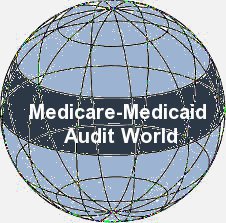 CMS has entered into contracts with numerous auditing companies to review provider billing for various purposes. As time goes by, it is more and more likely that billings submitted by almost every Medicare provider will be subject to review by one or more of these audit contractors. Set forth below is a brief description of the auditing functions of the various CMS auditors.
CMS has entered into contracts with numerous auditing companies to review provider billing for various purposes. As time goes by, it is more and more likely that billings submitted by almost every Medicare provider will be subject to review by one or more of these audit contractors. Set forth below is a brief description of the auditing functions of the various CMS auditors.
Medicare Administrative Contractors
 According to Chapter 3 of the Medicare Program Integrity Manual (PIM), in addition to their claims processing functions, Medicare Administrative Contractors (MACs) have the authority to review any claim prior to payment. MACs have the discretion to select target areas because of:
According to Chapter 3 of the Medicare Program Integrity Manual (PIM), in addition to their claims processing functions, Medicare Administrative Contractors (MACs) have the authority to review any claim prior to payment. MACs have the discretion to select target areas because of:
- High volume of services;
- High cost;
- Dramatic change in frequency of use and/or
- High risk problem-prone areas
What this means is that a MAC, unlike a RAC, does not have to obtain CMS’ approval of what procedures it will subject to prepayment review. Also, there is currently no limitation, other than the MACs discretion, as to how many Additional Document Requests (ADR) a MAC may make.
If the MAC feels that a certain procedure is being miscoded or that there is no medical necessity for a procedure, it will conduct a prepayment review of each claim submitted for extended periods of time. This means the provider will be subject to ongoing requests for records and suffer a substantial negative impact to its current cash flow.
Recovery Audit Contractors
A demonstration Recovery Audit program was authorized by § 306 of the Medicare Prescription Drug, Improvement and Modernization Act of 2003 and conducted from March 2005 to March 2008, in six states, to determine if Recovery Auditors could effectively be used to identify improper payments for claims paid under Medicare Part A and Part B. The Tax Relief and Health Care Act of 2006 made the program permanent and expanded it to cover the entire country. To implement the program, CMS divided the country into four regional areas.
The RACs are responsible for identifying improper payments for:
- Items or services that do not meet Medicare’s coverage and medical necessity criteria.
- Items that are incorrectly coded and
- Services where the supporting documentation submitted does not support the ordered service.
 Automated reviews conducted by the RACs typically focus on DME, physician and outpatient claims and do not require the production of additional records by the provider. Complex reviews, which do involve the production of additional medical records by the provider, involve coding issues, Diagnosis Related Group (DRG) validations and medical necessity reviews. CMS must approve the issue a RAC wants to review and has imposed limits on the number of medical records a RAC may request. Each RAC has established a website that lists, among other things, the claims that have been approved for audit.
Automated reviews conducted by the RACs typically focus on DME, physician and outpatient claims and do not require the production of additional records by the provider. Complex reviews, which do involve the production of additional medical records by the provider, involve coding issues, Diagnosis Related Group (DRG) validations and medical necessity reviews. CMS must approve the issue a RAC wants to review and has imposed limits on the number of medical records a RAC may request. Each RAC has established a website that lists, among other things, the claims that have been approved for audit.
CMS recently announced that a three year RAC pre-payment review demonstration project will begin on August 27, 2012. CMS conducted an Open Door Forum on August 9, 2012 to discuss the operation of this new program. The transcript of the Open Door Forum can be found here
Zone Program Integrity Contractors
In connection with the creation of the MACs, seven program integrity zones were created by CMS based on the newly established MAC jurisdictions. New entities entitled Zone Program Integrity Contractors (ZPICs) were created to perform program integrity functions in these zones for Medicare Parts A, B, Durable Medical Equipment Prosthetics, Orthotics, and Supplies, Home Health and Hospice and Medicare – Medicaid data matching. The operation of the ZPIC’s is described in Chapter 4 of the PIM
The primary goal of ZPICs, as opposed to MACs and RACs, is to investigate instances of suspected fraud, waste, and abuse. They also attempt to identify any improper payments that may be recouped by the MAC. In conducting their investigations, ZPICs may:
- Conduct interviews and/or onsite visits;
- Request medical records and documentation to perform medical reviews;
- Perform data analysis in coordination with CMS’ Center for Program Integrity’s Fraud Prevention System;
- Identify the need for administrative actions such as payment suspensions and prepayment or auto-denial edits;
- Withhold payments;
- Refer instances of potential fraud and abuse to CMS for administrative action or referral to law enforcement and
- Refer cases to law enforcement for consideration and initiation of civil or criminal prosecution.
To help providers and others identify the auditors working in each state, CMS has prepared an interactive map. Clicking on a state will display a list of each contractor providing audit services in that state.
Please contact us if we can be of any assistance in explaining the workings of the Medicare-Medicaid Audit World or in helping to resolve an issue with any of the legion CMS auditors.
 Medicare-Medicaid Audit World
Medicare-Medicaid Audit World






